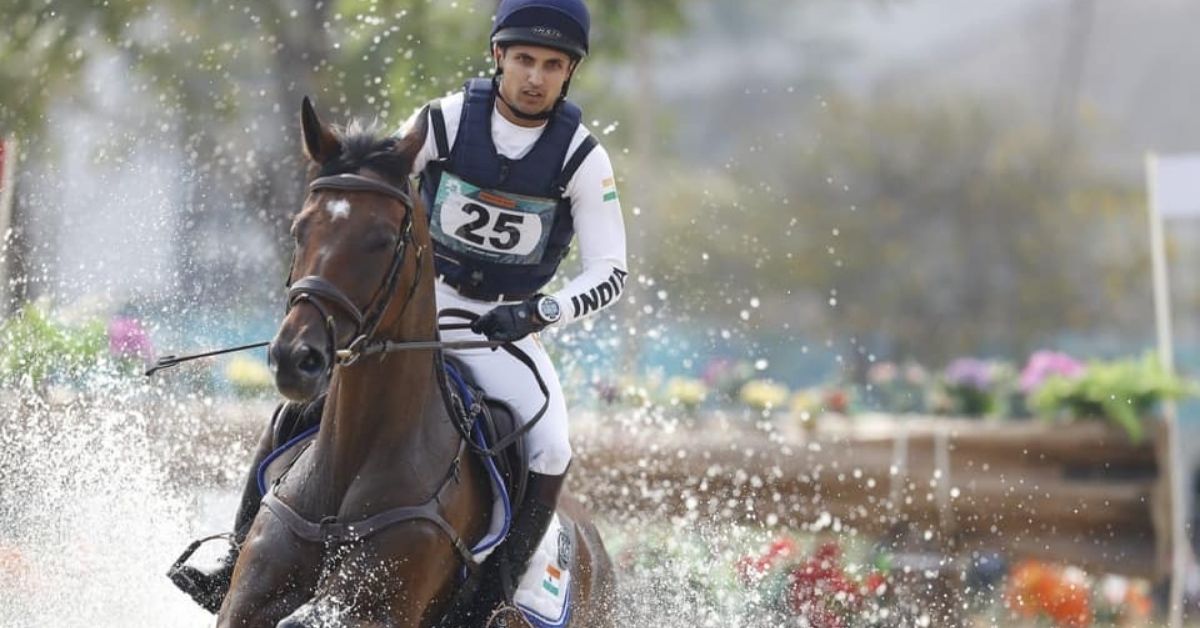What Links Fouaad Mirza to Dewan of Mysore: Seven Generations of Horse Lovers
As all eyes are on equestrian Fouaad Mirza, the first Indian equestrian rider from Bengaluru to secure a place in the 2020 Tokyo Olympics, here's tracing the journey of this world class athlete.

The hopes of every Indian are rising, as the country enters into the finals of equestrian sport at the 2021 Tokyo Olympics for the first time in history.
While the feat alone is a matter of fervour, having the country represented on this international stage by Fouaad Mirza only makes common sense.
His preparations for this international event have been in process since long before and his plans to enter the games were revealed amidst the glory of his last victory itself — a double silver medal in both Individual and Team categories at the 2018 Asian Games, Jakarta.
Talking about his current training schedule, he told Tokyo2020.org, “I begin training early in the morning and continue till 6 or 6.30 in the evening. I then go check on the horses later at night.”
Naturally, Fouaad has come to understand horses as much as love them. His journey with horses began when he was just five. It is also said that now, during events, Fouaad speaks to the animal, as he thinks they are the “real winners”.
Taking From a Lineage of Horse-Lovers
Fouaad’s father says that the sportsman’s ardent passion towards horse sports was never inspired by an external nudge. The renowned veterinarian, especially in the equestrian field, Dr Hasneyn Mirza, told News18 in an article: “I never sort of pushed either of them [both his sons] into it. For a long time both the boys were comfortable around horses. They didn’t ride for a long time. It was when they were five when they started riding. We never went on holidays. Because they were always practising or were in events. Riding was their holiday.”
So where does this level of focussed attention and devoted training come from? Some would say it runs in the blood, as fast and strong as the gelding he rides to the finish line.
Fouaad’s ancestry traces back to the dewan of the State of Mysore, Sir Mirza Ismail. While commonly known facts would go on to identify him as an Indian statesman in history books, posterity reveals the great love for studs that decked his familial culture.
In conversation with Deccan Herald, Dr Hasneyn shared, “Well there was an Aga Ali Askar who came from Iran in 1824 and brought horses with him. We have records to show that the family was involved with horses and racing for many years before it arrived here. Since Ali Asker arrived, our association with horses has been unbroken. At one time, he had nearly 700 horses stabled behind his house near Fathima bakery. Behind that (Johnson Market), the area is called Arab Lanes because all the Arabian horses were stabled there.”
Ali Askar was the grandfather of the dewan. Fouaad, the trailblazer, marks the seventh generation of his progeny.
“We realise that the horse is an intelligent animal and cannot be forced to do anything he doesn’t want to. We have to understand what it feels and communicate with it accordingly,” Fouaad shared with First Post.
The humble athlete extended his gratitude towards his gelding Seigneur Medicott, who was also the former partner of Olympic bronze medallist Bettina Hoy. Describing his companion, Fouaad says, “He’s a lovely horse — very attractive, very light and athletic and a true gentleman. He’s very honest and likes to please. He’s very sensitive too and likes to know the people with him.”
Even when the pandemic hit and the possibility of athletic events being cancelled globally became a possibility, this equestrian knew how to prioritise the animal over the sport. He told La Polo, “Horses need to be exercised or have access to a paddock where they can perform exercises of free choice. Restricting them to the stable may trigger problems, from colic to laminitis to injury or development of bad stable vices through sheer boredom.”
Edited by Yoshita Rao
If you found our stories insightful, informative, or even just enjoyable, we invite you to consider making a voluntary payment to support the work we do at The Better India. Your contribution helps us continue producing quality content that educates, inspires, and drives positive change.
Choose one of the payment options below for your contribution-
By paying for the stories you value, you directly contribute to sustaining our efforts focused on making a difference in the world. Together, let’s ensure that impactful stories continue to be told and shared, enriching lives and communities alike.
Thank you for your support. Here are some frequently asked questions you might find helpful to know why you are contributing?


This story made me
-
97
-
121
-
89
-
167











